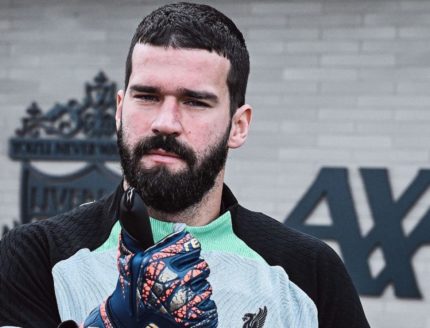Liverpool goalkeeper Alisson Becker has voiced concerns about UEFA’s new Champions League format, which could see clubs playing up to 17 matches to win the competition. The revised format introduces a ‘league phase’ where teams must play eight matches to determine whether they qualify for the knockout stages. Alisson Becker, speaking ahead of Liverpool’s opening group stage clash against AC Milan at the San Siro, expressed frustration that the changes were made without consulting the players.
In a pre-match press conference, Alisson Becker sarcastically remarked, “It’s always a good idea to add some games to the calendar that is not busy – I’m being ironic a little bit!” The Brazilian keeper stressed the need for football authorities to listen to players’ concerns. He noted that players need time to rest and recover if they are expected to maintain peak performance. Alisson Becker ’s comments reflect growing discontent among professional footballers regarding the intensifying fixture schedules imposed by football’s governing bodies.
Concerns Over Player Fatigue and Intense Schedule
The introduction of additional games in UEFA’s Champions League comes amid wider concerns over player workload. Alisson Becker’ s criticism follows a recent FIFPRO report highlighting the physical toll on footballers who are expected to play in multiple competitions with little rest between matches. Manchester City midfielder Bernardo Silva also raised similar concerns, calling the schedule “crazy.” For Liverpool, the extended European calendar adds to an already busy season, with Premier League, EFL Cup, and international commitments also on the horizon.
Alisson Becker argued that such fixture congestion prevents players from performing at their best, especially without sufficient rest. He said, “If you’re tired, you can’t compete at a high level. We need a solution to that.” The growing strain on players has led many in the football community to call for better management of match schedules and a more balanced approach to tournament formats, one that takes player welfare into account. Alisson Becker’s words resonate with a growing consensus that while fans may enjoy more matches, the players are the ones bearing the physical burden.
Liverpool’s Determination to Win Despite Challenges
Despite the grueling schedule that lies ahead, Alisson Becker remains optimistic about Liverpool’s chances in the competition. Having missed out on Champions League football last season, the Brazilian goalkeeper emphasized how important the tournament is to him and his teammates. “Playing in the Champions League is one of the reasons I came to Europe from Brazil,” Alisson Becker said. “Not playing in it last season was really hard.”
He went on to describe the team’s excitement about returning to the Champions League and their determination to go all the way. “We are all looking forward to being back in it. We will do our best to try and win,” he added. For Liverpool, the challenge is not only to balance the intense fixture list but also to maintain their top form in a competition they have historically thrived in. As Alisson Becker and his teammates prepare to navigate a tough season, their resilience and depth will be tested as they aim for European glory once again.
Allison Becker Calls for Dialogue and a Balanced Calendar
The 31-year-old goalkeeper, who recently returned from international duty with Brazil, believes that discussions involving all parties—players, football associations, and broadcasters—are necessary to find a fair solution. “It’s not just about how many matches we play. Whether it’s 30 or 40 games a season, the reasonable thing would be for all the people involved to sit together and listen to everyone,” Alisson Becker stated. He emphasized the need for dialogue to ensure that football’s direction is sustainable and does not overburden the players.
Alisson Becker’s comments are part of a growing chorus of voices within the football community calling for more player-centered decision-making. He concluded by reiterating that while players understand the commercial pressures behind the expanding football calendar, the current trajectory is unsustainable. “We are not stupid; we understand people want more games. But we need to be listened to if we want to keep the quality of the game high and protect the health of the players.”














